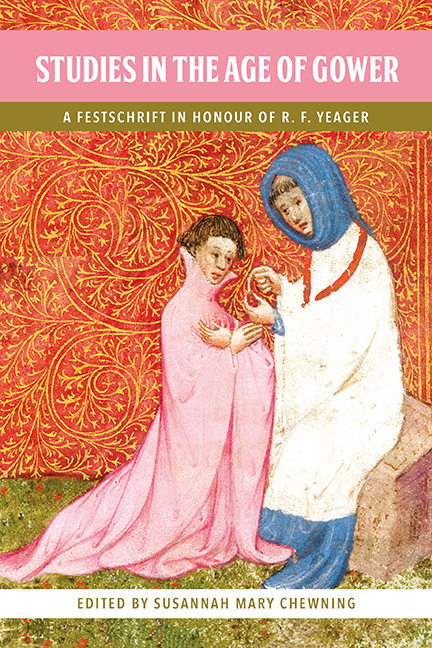Book contents
- Frontmatter
- Contents
- List of Illustrations
- Notes on Contributors
- Acknowledgements
- List of Abbreviations
- Introduction
- Part I Text
- Part II Gender
- Part III Time
- Part IV Spirit
- Part V Intersections
- A Personal Tribute to R.F. Yeager
- Bibliography of R.F. Yeager’s Writings
- General Bibliography
- Index
- Miscellaneous Endmatter
8 - What’s in a Name? History, Genre, and Political Speech in Gower’s Cronica Tripertita
Published online by Cambridge University Press: 28 April 2020
- Frontmatter
- Contents
- List of Illustrations
- Notes on Contributors
- Acknowledgements
- List of Abbreviations
- Introduction
- Part I Text
- Part II Gender
- Part III Time
- Part IV Spirit
- Part V Intersections
- A Personal Tribute to R.F. Yeager
- Bibliography of R.F. Yeager’s Writings
- General Bibliography
- Index
- Miscellaneous Endmatter
Summary
I HAVE LONG BELIEVED that the post-Conquest development of the chronicle tradition in England planted the seeds that would allow England to define itself in terms resembling the modern nation-state. I have stressed that chroniclers such as Laȝamon represent the embryonic beginnings of England's path toward the development of a strong national identity. While this essay is not the place to go into those arguments in depth, a cursory account is important in contextualizing how I look at John Gower's Cronica Tripertita, circa 1400. Regardless of their contribution to national development, chronicles in post-Conquest England are intrinsically political. As Leah Shopkow has noted, “Medieval historians almost never defined history; the names they gave to works we call history suggest that history was a fairly amorphous field” and that when “medieval writers made distinctions between one sort of writing about the past and another, it might be in terms of style rather than format.” Even though terms such as annals, chronica, series temporum, and gesta were used indiscriminately by medieval writers of history, “that does not mean that writers confused these various uses.” The fluid nature of the language of the past employed by medieval authors provided the ideal framework through which to work out new ideas about community and identity that as yet had no developed discourse. The very instability of this language made it ideal for political discourse. Chronicle was an ideal springboard, because, as Gabrielle Spiegel has noted, “What made the writing of history important in the Middle Ages … was exactly its ability to address contemporary political life via a displacement to the past.”3 Spiegel has argued that “texts both mirror and generate social realities, and are constituted by and constitute the social and discursive formations which they may sustain, resist, contest, or seek to transform.” What we see with the proliferation of chronicle literature beginning in the twelfth century is a process by which a community is beginning to “think” the nation. Indeed, John Gillingham has made the observation that “The English passion for history was, in effect, a creation of the twelfth century.” That chronicle extended its scope from an interest in the sacred role of history to include the secular importance of history is immensely important.
- Type
- Chapter
- Information
- Studies in the Age of GowerA Festschrift in Honour of Robert F. Yeager, pp. 135 - 142Publisher: Boydell & BrewerPrint publication year: 2020



